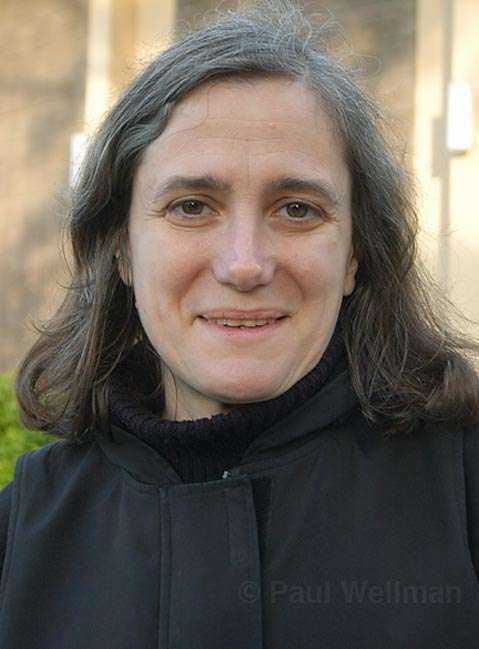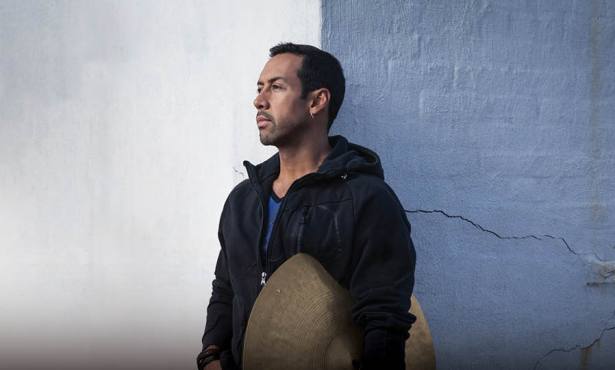Translating the Static
Democracy Now!'s Amy Goodman Chats About New Book and Other Things Progressive

Amy Goodman is one of very few American celebrities who owes her stardom to her role in the independent media movement. Thanks to the success of her radio program Democracy Now!, Goodman’s voice is currently heard on more than 500 public radio and television stations. With her self-titled theory “trickle-up journalism” and her show’s slogan “steal our stories,” Goodman’s modesty and tenacity color her commitment to uncover buried stories and air silenced voices.
Originally from Bayshore, New York, Goodman (pictured at right; credit: Michael Keel) graduated from Harvard and found her way back to New York City, where she stumbled upon Pacifica Radio, a network founded by pacifist Lew Hill in the 1940s. After a quick video documentary class, Goodman began volunteering at the station and eventually became its news director. In 1996, she introduced Democracy Now! to the public, and the rest is independent media history.
Goodman’s latest book Static: Government Liars, Media Cheerleaders, and the People Who Fight Back is her second work of collaboration with her investigative journalist brother David Goodman (who is pictured below). The book contends that media and the government are not such strange bedfellows; rather, as Goodman puts it, “There’s a shared consensus between those who run the media and those who run the government.” I recently spoke on the phone with Goodman-who will visit UCSB this Sunday, September 24-about her commitment to independent media.
Are we really living in a propaganda state, as you and your brother contend?
The Bush administration could not have accomplished what it did in terms of the invasion of Iraq without the complicity of the media. What we see on television is a small circle of pundits who know so little about so much, explaining the world to us and getting it so wrong. President Bush might have convinced a few people by repeatedly intoning, “WMDs, WMDs,” but he had something much more powerful behind him. The media are the most powerful institutions on earth-more powerful than any bomb, any missile.
It seems as though the government has always been involved with the media. Has the media ever been truly independent and uncensored?
There are now more channels than ever, but what matters is who owns those channels, who the media moguls are, and the kind of homogenous voice for war that is created. In the old Soviet Union, you knew if you read [the leading newspaper] Pravda, you had to read between the lines; you couldn’t believe everything you read. In this country, people historically haven’t had that critical perspective because of the idea that there is a free press. But now people have seen the huge hijacking of the media, how it has worked for the administration, and we see that the lies take lives. So many people have suffered as a result of coming to believe what they have heard, seen, and read about over and over again-that WMD lie that provided the pretext for war. What is encouraging now is the growth of independent media, which has gained new audiences around the country and across the political spectrum.
It is often argued that corporations are too involved with news coverage. Static contends the news is endorsed by the government. Do you think the government actually controls the media, or rather controls the corporations that control the media?
I think there’s a shared consensus between those who run the media and those who run the government. Pentagon spokesperson Pete Williams, for example, becomes the chief correspondent for NBC, which is owned by General Electric, one of the major nuclear weapons manufacturers in the world; in other words, he goes to work for a military contractor, in a sense, that owns NBC. These private corporations are using public airways, which are a national treasure. It’s not just their private property; this is common ground. They have a responsibility to bring out the full diversity of opinion, or lose their license.
What is your primary source of news?
I have no one primary source. I follow many different sources and that’s what I think is very important for people to have. The Internet can be a great globalizing force in terms of getting information from around the world. But we always have to double-check and double-source. If [telecommunications companies] succeed in privatizing the Internet and charging not only the user but the content provider, then you will have a situation where ATT.com comes up immediately, but democracynow.org might take a while. The Internet is an incredible public resource that was developed by the government with taxpayer money, but now that it’s researched and refined and viable, it’s taken over by private corporations. That’s not acceptable and people are responding all over this country.
Are the New York TimesL.A. Times, the Washington Post, and the Democracy Now! not independent? Do you feel sources like are the only type of independent media?
I would say nothing is the only source. Look at the New York Times’s coverage of their own coverage of the war: they published their mea culpa as they call it (we call it their kind-of culpa) on page A-10, after many above-the-fold stories asserting WMDs. We need a media that challenges those in power. It’s not enough to have a piece on A-10 saying, “Well, maybe we got it wrong.”
So often when the corporate media talk about balance, they’re talking about the spectrum of opinions between Democrats and Republicans, which is often almost nil. We need a media that is not a party to the party, but sees the debate as much broader than the parties are willing to go.
Do you risk losing credibility if your reporting invariably expresses a partisan viewpoint?
We are not partisan; we are not there to serve as a platform for one party or another. We’re there to be as close to the ground as possible-to bring out the stories, the images, to go to where the silence is. Unfortunately, it is the media that has become fiercely partisan, giving voice to one party or the other. It is not a problem to express a point of view; what matters is that you are accurate and fair and you give space for different voices to be heard.
Who do you think is doing a good job in journalism today?
Well, I think the explosion of blogs is a response to the media getting it so wrong. The conventional media is losing audience because of how untrustworthy they have become. I’m not saying the corporate media don’t do the occasional very important expose, but what matters in this country is the drumbeat coverage, the day-to-day coverage. : The media watch group FAIR (Fairness and Accuracy in Reporting) did a study of the two weeks around Colin Powell giving his push for war at the UN in February 2003. They looked at the four major nightly newscasts-ABC, NBC, CBS, and the PBS news hour with Jim Lehrer-and they found that of the 393 interviews around war, only three were with anti-war leaders. That is no longer a mainstream media. That is an extreme media beating the drums for war.
Are there any conservative pundits out there whom you respect?
I look for accuracy, for people who got it right early on when it came, for example, to weapons of mass destruction. The whole low-power FM movement FM movement has been remarkable in how it has challenged the media moguls in court and on the ground to get out the voices of people in their own community.
A lot of liberals and progressives use you as a sort of rallying cry for the correct way to do reporting. Do you feel that’s because you are part of the independent media or because you espouse a traditionally liberal or progressive viewpoint?
I was lucky in the beginning of my career to find what most people look for their whole career, and that’s independence. I think the power of Democracy Now! is that it opens the microphone to a full diversity of voices, and hearing those voices is what gives people hope. As we travel around the country, the response is astounding. I always thought people found the information too difficult to hear, but I’m always amazed at how hopeful people find it because information is power-it allows you to decide what to do once you have that information.



